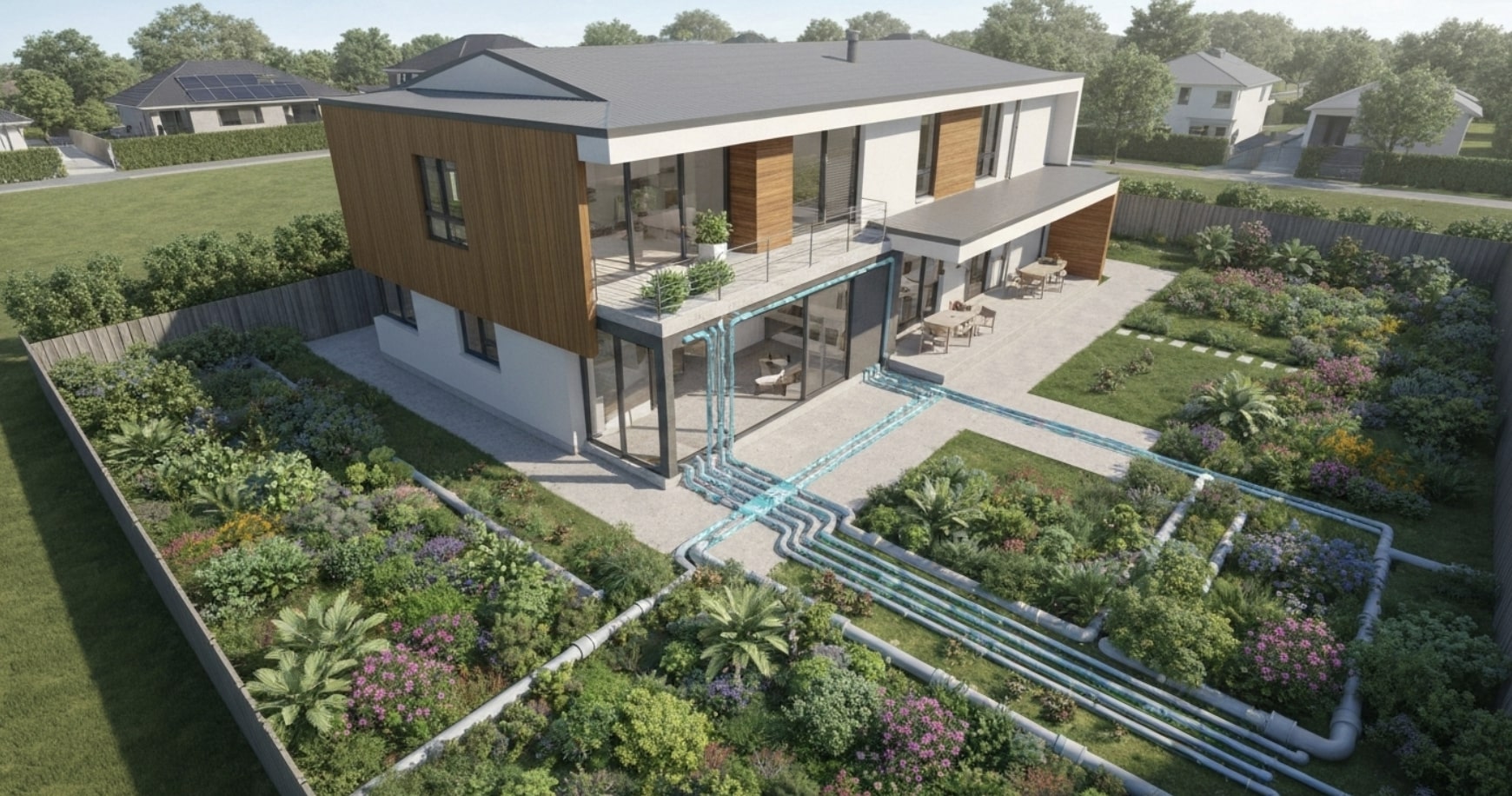Have you ever wondered if there’s a smarter way to handle your home’s water usage? With growing concerns about water shortages, many homeowners are exploring sustainable solutions. Greywater systems offer a practical way to conserve this precious resource by recycling water from your daily routines. This guide will answer your question, “Are greywater systems right for my home?”, weighing their advantages and disadvantages.
What is Greywater?
So, what exactly is greywater? Think of it as the gently used water from your clothes washer, showers, bathtubs, and bathroom sinks. This water contains traces of soap and detergent, but it’s clean enough for other applications, primarily landscape irrigation. It’s a fantastic secondary water supply that can keep your garden green even during dry spells.
It’s important to understand what greywater is not. Water from your toilet (known as black water) or water used to wash diapers is never considered greywater due to contamination. In some regions, like California, water from the kitchen sink is also excluded. Unlike rainwater, grey water should not be stored for more than 24 hours to prevent bacteria growth, making its immediate use a key part of any greywater system.
The Pros of Greywater Systems
1. Save Water (and Lower Your Utility Bill)
Greywater systems can reduce a home’s freshwater usage by 30–50%, depending on usage habits and system size. That’s a huge win for areas facing water restrictions or rising water costs.
2. Eco-Friendly Landscaping
Using greywater to irrigate your lawn or garden reduces reliance on sprinklers and hoses. The benefits of greywater include that plants benefit from the nutrient-rich water (especially from laundry systems), and you’re not wasting clean drinking water to keep your landscaping green.
3. Reduced Strain on Municipal Systems
Reusing greywater means less demand on sewage treatment facilities and stormwater systems—especially during heavy rainfall or drought conditions.
4. Increased Resilience During Droughts
When water restrictions kick in, homes with greywater systems are better positioned to maintain basic irrigation and non-potable functions.
5. LEED or Green Certification Points
If you’re building a sustainable home or aiming for LEED (Leadership in Energy and Environmental Design) certification, installing a greywater system can contribute points toward your rating.
The Cons of Greywater Systems
1. Installation Costs Can Be High
A basic laundry-to-landscape greywater system might cost a few hundred dollars, but a full home greywater reuse system can run $2,000–$10,000+, depending on your plumbing layout, permits, and system complexity.
2. Local Codes & Permits Required
Greywater use is legal in many areas—but often regulated. You may need permits, inspections, or design approval before installing a system. In California, for example, some systems are exempt from permits, while others are strictly regulated.
3. Maintenance is Ongoing
Filters need cleaning. Pipes need inspecting. You’ll need to ensure no harsh chemicals or detergents enter the greywater stream. Maintenance is manageable—but not “set it and forget it.”
4. Not Suitable for Every Property
Homes with older plumbing systems or small yards may not benefit enough to justify the cost. Similarly, properties on steep slopes or with impermeable soil might not be ideal for landscape irrigation.
5. Health & Safety Concerns
While greywater is relatively clean, it can contain bacteria and organic matter. It should never be used for drinking or cooking and must be used within 24 hours to prevent odor and contamination.
Is a Greywater System Right for Your Home?
Ask yourself the following:
- Do you live in an area with water restrictions or high water rates?
- Do you have gardens, trees, or landscaping that need regular irrigation?
- Are you open to some system maintenance or already use eco-friendly detergents?
- Are you remodeling or building a home, making plumbing access easier?
- Can your local city or county permit the system legally?
If you answered yes to most of the above, you may be an ideal candidate.
Types of Greywater Systems (Quick Overview)
Greywater systems range from incredibly simple to highly complex. As complexity increases, so do the costs and maintenance needs. How much does it typically cost to set up a greywater system for a residential property? The table below gives a general idea.
| System Type | Best For | Approx. Cost | Permit Required? |
|---|
| Laundry-to-Landscape | Simple irrigation | $150–$1,000 | Often not required |
| Branched Drain Systems | Gravity-fed yard irrigation | $500–$3,000 | Sometimes |
| Pumped Systems | Larger or uphill yards | $2,000–$8,000 | Usually required |
| Treated Systems (Storage) | Toilet flushing, reuse | $5,000–$15,000+ | Almost always |
Pro Tips for Greywater Use
Here are some pro tips to ensure your grey water use is safe and effective:
- Use biodegradable, plant-friendly detergents (no salts, boron, or bleach)
- Never store untreated greywater for more than 24 hours
- Direct water to mulch basins, not sprinkler systems
- Don’t use greywater on edible root vegetables (like carrots or potatoes)
- Label your system and educate household members on safe use and runoff.
- Regularly inspect your plumbing system outlets to ensure even distribution and prevent clogs.
Your Go-To Team for Every Plumbing Needs—Target Plumbers
Feeling inspired to explore greywater systems but not sure where to start? A successful installation requires careful planning and expertise, and that’s where we come in. At Target Plumbers, we specialize in all aspects of your home’s plumbing system, from simple repairs to complex, eco-friendly upgrades. We can help you navigate the options and determine the best solution for your property and budget.
Our licensed professionals understand the specific requirements for installing greywater systems safely and according to local codes. We ensure your new system integrates seamlessly with your existing plumbing, providing a reliable water supply for your landscape without compromising your home’s sanitation. Don’t leave your project to chance. Contact us today to discuss how we can help you conserve water and enhance your home’s sustainability.
Conclusion
“Are greywater systems right for my home?” Greywater systems offer a sustainable solution for homeowners looking to conserve water and reduce their environmental footprint. By understanding the pros and cons of these systems, you can make an informed decision about whether they are suitable for your home. Remember, implementing a greywater system requires careful consideration of your plumbing infrastructure, local regulations, and maintenance needs.
Looking for more ways to future-proof your home’s plumbing? Greywater systems are just one piece of the puzzle. Check out our article on Innovative Smart and Sustainable Plumbing Solutions for 2025 to explore how modern technology is transforming water use, efficiency, and home design. And if you’re tackling everyday plumbing issues too, don’t miss our guide on Why You Shouldn’t Ignore That Dripping Faucet—because even small leaks can have big consequences.
Frequently Asked Questions
Is greywater safe to use for gardening and landscaping?
Yes, properly handled grey water is generally safe and beneficial for irrigating ornamental plants, shrubs, and fruit trees. However, you should avoid using it on root vegetables or any edible plants where the water might touch the food. Using plant-friendly detergents will also help protect your soil and water supply.
What types of homes are best suited for greywater systems?
Homes with outdoor spaces like gardens, lawns, or numerous trees are ideal candidates for greywater systems, as they can directly use the recycled water. Properties with enough space to install the plumbing system and that are not located near natural water bodies or in areas with high groundwater are most suitable.
How do I know if I need special approval to install a greywater system?
Whether you need a permit depends on your location and the complexity of the grey water system. Simple laundry-to-landscape systems often don’t require one, but any system that involves altering your home’s plumbing system or using a pump will likely need approval. Always check with your local building or planning department first.






